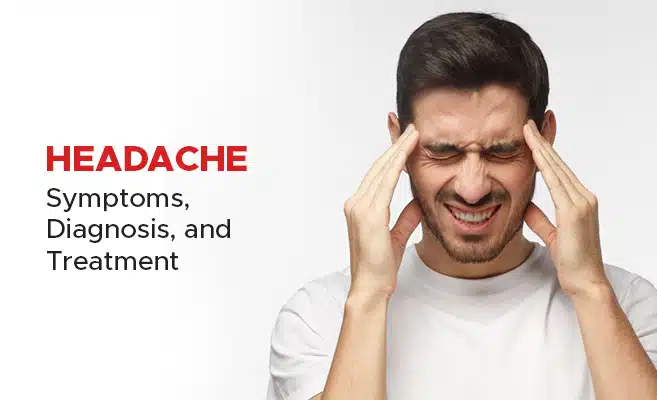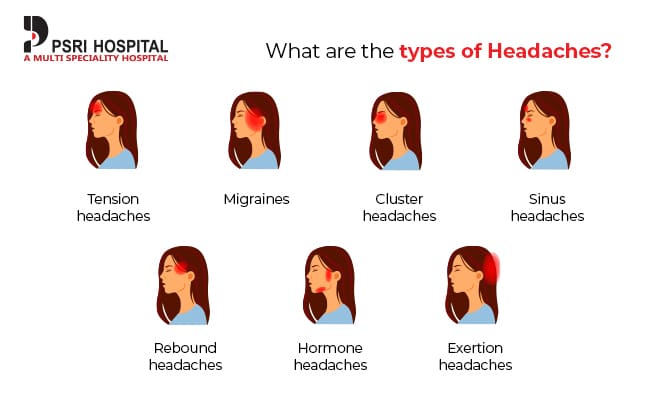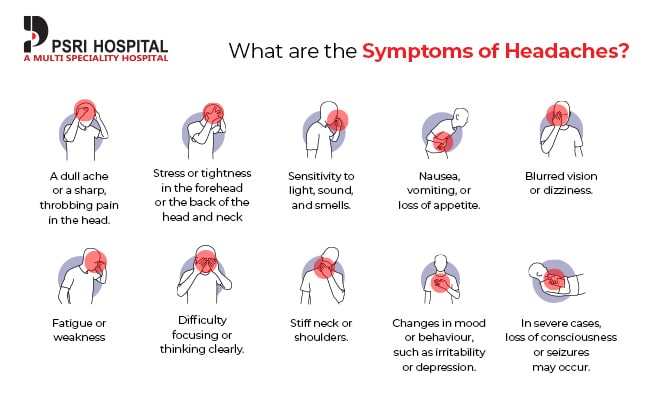Headaches – Types, Causes, Symptoms, Diagnosis, and Treatment

Headaches can be a real pain – literally! They can really disrupt our daily lives from mild discomfort to a debilitating throb. But did you know that there are different types of headaches, each with its own unique symptoms and underlying causes? Understanding these differences is key to effectively controlling and treating them.
This article will discuss headaches, from their types and causes to diagnosis and treatment options. Get ready to say goodbye to those pesky headaches for good!
This guide explores headache types and causes to help relieve pain and discomfort, whether you suffer from normal headaches or chronic migraines. So, let’s get started and discover the causes and treatment options for various types of headaches!
What are the Types of Headaches?
There are several types of headaches, and various elements can cause them. Some of the most common headache types include:

- Tension headaches: These are the most common types of headaches and are usually driven by tension, anxiety, or muscle stress in the neck and head.
- Migraines: Migraines are headache types that can be excruciating and debilitating. They are usually accompanied by other symptoms such as nausea, sensitivity to light and sound, and visual disorders.
- Cluster headaches: Cluster headaches are rare but quite painful headaches that occur in clusters or cycles. They generally cause extreme pain on one side of the head and may be accompanied by other signs such as eye-watering and nasal congestion.
- Sinus headaches: Sinus headaches are caused by inflammation in the sinuses and are usually accompanied by signs such as facial pain, anxiety, and congestion.
- Rebound headaches: Rebound headaches can occur when someone overexposes headache medication, leading to a rebound effect when the medication wears off.
- Hormone headaches: Hormone headaches are generally experienced by women and are usually related to hormonal transformations during the menstrual cycle.
- Exertion headaches: Exertion headaches are induced by physical work, such as exercise, and are usually described as a throbbing pain that begins at the base of the skull and radiates to the forehead.
Other less common types of headaches include thunderclap headaches, which are sudden and intense, and ice picks, which generate short, stabbing pain.
It’s essential to note that the types of headaches and causes can be complicated and alter from person to person. Some common reasons include anxiety, lack of sleep, dehydration, specific foods, environmental factors, and underlying medical ailments. If you are undergoing regular or severe headaches, it’s essential to talk to your healthcare provider to resolve the underlying cause and make an appropriate headache treatment plan.
What are the Causes of Headaches?
Headaches can have a variety of causes, and the exact reason they occur is not always clear. Possible causes of daily headaches include:
- Illness: Headaches can be a sign of many illnesses, such as infections, colds, fevers, sinusitis, throat or ear disorders, and head injuries.
- Stress: Emotional tension and depression, as well as lifestyle aspects such as alcohol use, missing meals, differences in sleep patterns, and taking too much medicine, can all contribute to headaches. Poor posture and neck or back pressure can also cause headaches.
- Environment: Exposure to secondhand tobacco smoke, intense odors from household chemicals or fragrances, allergens, and specific foods can trigger headaches. Other possible triggers are pressure, pollution, noise, lighting, and temperature changes.
- Genetics: Headaches, particularly migraines, tend to carry forward in families. Children and teens with migraines usually have other family members who also experience them.
- Migraines: The actual cause of migraines is not fully understood, but one theory indicates that a problem with the electric charge through nerve cells causes a series of changes that lead to migraines. Too much physical activity can also activate migraines in adults.
Headache treatment relies on the underlying cause. Lifestyle modifications like getting enough sleep, staying hydrated, managing anxiety, and avoiding triggers may help control headaches. Over-the-counter pain medications can help relieve headaches.
If headaches are recurring or severe, a doctor may specify stronger medication or suggest other treatments, such as physical therapy, biofeedback, or acupuncture. It’s essential to consult with a healthcare provider to choose the cause of daily headaches and develop a suitable treatment plan. PSRI Hospital has a team of expert doctors who have experience in providing the best-suited headache treatment.
What are the Symptoms of Headaches?
The symptoms of a headache can differ depending on the type of headache and its causes. Common symptoms of headaches include:

Suppose a headache comes on suddenly, is too severe, or is accompanied by other signs such as confusion, weakness, numbness, or difficulty speaking. In that case, you must seek treatment for the severe headache.
In such cases, it’s necessary to seek headache treatment immediately. Emergency treatment of headaches may involve medicine to relieve pain and diagnostic tests such as a CT scan or MRI to identify any underlying conditions that may be causing the headache. Talking to a healthcare provider about any unusual or severe headaches you experience is important, as prompt diagnosis and treatment can help prevent serious complications.
Diagnosis of Headaches
Headaches can have different causes and may be diagnosed based on several factors, including:
Medical History: A doctor will generally ask questions about the nature of the headache, including its area, intensity, frequency, time, and any associated signs such as nausea, vomiting, sensitivity to light, or vision modifications. They will also ask about any past medical records, such as a history of head damage or a family history of headaches.
Physical Exam: During a physical examination, a doctor will look for symptoms of physical issues that could be causing headaches. They may also conduct neurological tests to evaluate brain function.
Imaging tests: Imaging tests such as CT scans, MRI scans, or X-rays may be utilized to identify any structural anomalies in the brain or neck that could be causing headaches.
Blood tests: Blood tests can help determine any underlying medical ailments contributing to the headaches.
Based on these factors, a doctor may analyze a specific type of headache, such as tension headaches, migraines, cluster headaches, or cervicogenic headaches. Sometimes, a doctor may refer a patient to a specialist for further evaluation and headache treatment.
How to Cure Headache?
Now, it’s time to get some knowledge about headache treatment. The treatment of a headache depends on its cause and severity. Here are some common treatments:
Over-the-counter medications: Non-steroidal anti-inflammatory drugs (NSAIDs), such as ibuprofen or aspirin, can help reduce pain and decrease inflammation associated with stress, headaches, or migraines. Acetaminophen (Tylenol) can also be effective for some types of headaches.
Prescription medications: Triptans are pharmaceutical drugs used to treat migraines. Other medicines, such as beta-blockers, antidepressants, or antiepileptic drugs, may be used to control or reduce the frequency of migraines or anxiety headaches.
Lifestyle changes: Avoiding stimuli such as specific foods, stress, and enough sleep can help prevent headaches. Engaging in routine exercise, keeping a healthy diet, and controlling stress through relaxation techniques or headache treatment may also be helpful.
Emergency treatment: Immediate treatment for headache may be necessary for severe headaches, such as those associated with a brain hemorrhage or stroke. Treatment may include medications to relieve swelling and discomfort, surgery to repair damaged blood vessels or other necessary interventions.
It’s essential to consult with a doctor to decide the best treatment approach for your specific type of headache. In some cases, it may be a symptom of an underlying medical condition that requires emergency treatment of headaches, so a proper diagnosis is important for effective treatment.
Conclusion
In conclusion, if you are experiencing regular or severe headaches, you must consult a healthcare professional for an exact diagnosis and individualized treatment plan. With the correct approach, most people with headaches can actually manage their symptoms and improve their overall quality of life.
Look no further than PSRI Hospital for the best expert advice and treatment. Our team of experienced professionals is well-versed in providing the most suitable treatments for those needing the best or immediate treatment for headaches.
FAQs
What are the most common types of headaches?
The most common headache types are tension headaches, migraines, and sinus headaches. Tension headaches involve tightness in the head and neck, migraines have severe throbbing pain and other symptoms, while sinus headaches involve facial pressure and congestion.
What foods can trigger headaches?
Foods like aged cheeses, processed meats, chocolate, caffeine, artificial sweeteners, MSG, and alcohol are common headache triggers for many people.
When should you seek emergency treatment for a headache?
Seek emergency care if you have sudden severe head pain, weakness/numbness, trouble speaking, confusion, seizures, or head injury symptoms like vomiting or loss of consciousness.
What natural remedies can relieve headaches?
Applying peppermint oil, getting a massage, taking magnesium supplements, reducing stress, staying hydrated, and getting enough sleep may help provide natural headache relief.

 Book An Appointment
Book An Appointment Virtual Consultation
Virtual Consultation





